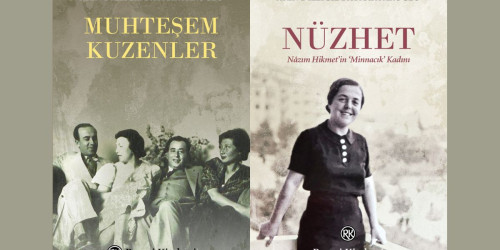
College Senior Associate publishes two historical novels
Arın Dilligil Bayraktaroğlu adds to her previously published books and scientific articles on Turkish language and culture within the scope of…
Lucy alumna, Dr Zoe Angelis, talks about her academic research and journey to publication.
I grew up in Athens and, as an undergraduate, I studied Law at the National University of Athens. I further pursued a Masters degree in European Law, at Panthéon-Assas, in Paris as well as an MA in European Culture at UCL, in London. Finally, in 2019, I obtained a PhD in French at Lucy Cavendish College, Cambridge University, under the supervision of Ian James. My PhD provided a renewed reading of two key French thinkers of the twentieth century, Maurice Blanchot and Georges Bataille, situating them at the crossroads of post-deconstruction (welcoming the real, experience, senses) and anti-realism (differentiating the real from empirical reality and the current state of affairs).
Lucy stood out as a diverse, dynamic college which offered intellectual vibrancy, while being a warm and friendly place. Everyone in Lucy – the President, the staff, the Fellows – was helpful, cared about our wellbeing and made us feel at home. I loved the gardens and I fondly remember walking on the grass and practising yoga outdoors. Throughout the years, I have immensely appreciated my exposure to and interaction with the diverse backgrounds, nationalities, interests and areas of expertise of the Lucy community.
I am currently teaching English at the French lycée of Athens to both middle school and high school francophone pupils. When designing my courses, I draw on my areas of study and interest – literature, culture and law – readapting them to meet my pupils’ wants and needs. For example, to capture the attention of my 6ème pupils (11 years old), I approach Shakespeare through the angle of ghosts by focusing on Hamlet and Macbeth; to intrigue the Terminale students (17 years old) into significant events of twentieth century American History, I present the evolution of American protest music from Billie Holiday’s Strange Fruit to Kendrick Lamar’s Humble.
One of the most important learnings of my PhD is that a questioning attitude and critical thinking count more than knowledge, information and conclusions. In this respect, when delivering my courses, I encourage pupils to be inquisitive and curious to what we see, read or hear in class. From my PhD I’ve also learnt how to communicate my ideas with clarity and precision, which has proved tremendously helpful when teaching a class.
I always enjoyed conducting research and being able to present my work, share my arguments and ideas, engage in critical debate with experts in my field as well as with a wider and more diverse audience. In this respect, teaching comes as a compensation after the more solitary path of my PhD work.
In parallel, I am currently co-editing (with Pierre Bayard) a French volume entitled Ancient myths and detective criticism, which is forthcoming in 2025. The volume will be a published record of a bilingual, French-English, conference that I co-organised in Athens, in March 2023. The articles of the volume, via critical close readings, investigate inconsistencies as well as incomplete and contradictory elements of ancient Greek texts and bring about multiple readings, new interpretations and renewed insights into classical texts.
The book A Critical Encounter: Bataille and Blanchot. Exploring the Literary Real addresses two questions that are constantly entwined: first, what kind of ‘real’ is involved and disclosed in writing – and how does this differ from reality in its more traditional sense? Second, what is writing’s own mode of ‘being’? The book investigates the real impact the existence of literature has on our lives: how it challenges and reconfigures the way we perceive ourselves, our place in the world and our relations with others.

I submitted my PhD in November 2019 and had my viva in February 2020. In April 2020, I sent a proposal to the annual ‘imlr books’ competition, launched by the IMLR (Institute of Modern Languages Research, which has now changed its name into ILCS, Institute of Languages, Cultures and Societies). The ‘imlr books’ series publishes original monographs, conference volumes or collections of essays which foster the study of literary texts and cultural productions in Modern Languages (French, German, Italian, Portuguese, Spanish) as well as comparative studies in fields other than Linguistics. My proposal consisted in the transformation of my PhD into a monograph, designated the need – the market – for the book, included a chapter-by-chapter synopsis as well as a sample chapter, and was finally selected for publication by the editorial board.
The editing process lasted 2 years. At first, within one year of acceptance of my proposal, I submitted the first draft of my book taking into account the remarks of the peer review committee, who still remains unknown to me. Then, an experienced copy-editor liaised regularly with me and provided chapter-by-chapter feedback. Overall, the publication journey was enjoyable, challenging and rewarding. It made me feel that my academic research and specialist knowledge in a given area, that of twentieth century literature, could reach a wider audience, guide undergraduate students and touch upon real life concerns.
In terms of future goals, I am aspiring to find a position which would allow me, alongside my teaching, to pursue my research interests in European literature and culture in a more systematic and institutionalised way.